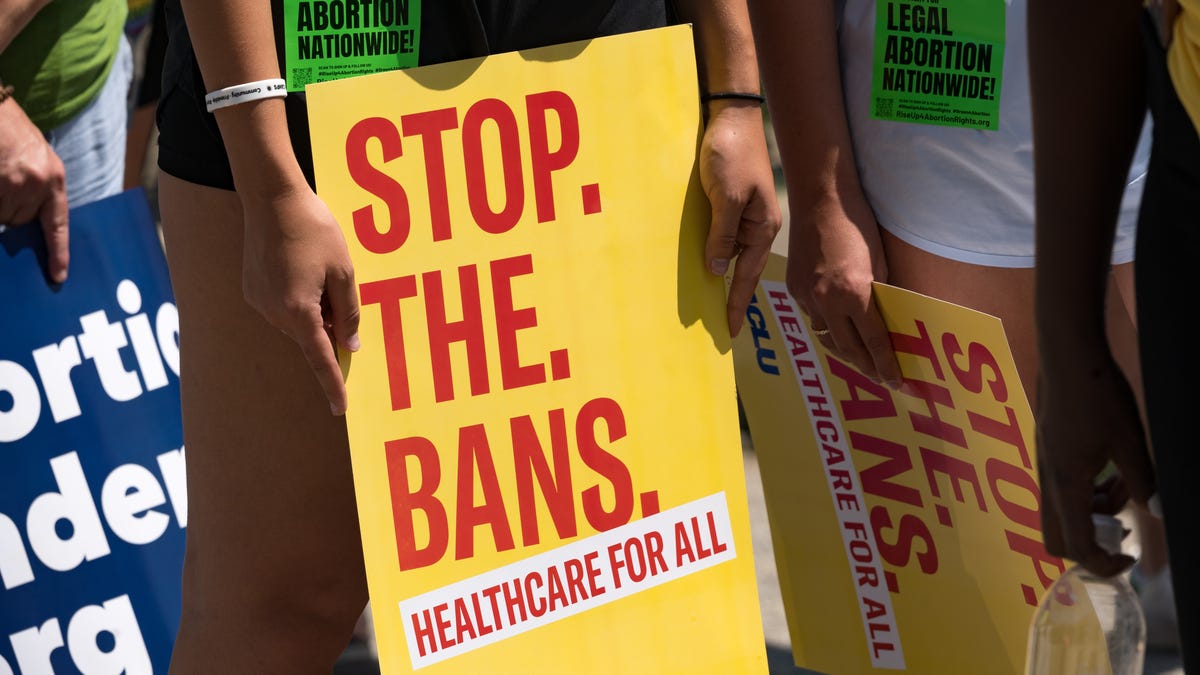Opinion: As an OB-GYN in the South, abortion bans hinder my ability to ‘do no harm.’
The array of bans and regulations enacted since the Supreme Court’s decision on abortion means that more women are seeking procedures further away – and more physicians are leaving their practices.
With abortion laws on ballots in at least 11 states this year, the impact of the Dobbs v. Jackson Women’s Health Organization ruling is glaringly evident. Women are increasingly forced to seek basic medical care beyond their state limits.
As an OB-GYN practicing in the South, I now check a patient’s location before I even glance at her medical history. This isn’t standard practice.
In the past, I’d begin by reviewing a patient’s records to understand her health needs. Now, I first assess where she resides: Am I dealing with a local patient familiar with Georgia’s stringent abortion regulations? Or does she come from Alabama, Tennessee, or Mississippi, where the laws are even more restrictive?
Every day, I grapple with the latest news about neighboring states’ abortion laws. Are the bans currently enforced, or have they been temporarily halted by legal action? Do these laws offer exceptions for rape, incest, or the health of the mother? Will I face legal consequences for providing care to a woman traveling from another state?
This uncertainty can have tragic outcomes. I often prepare myself to send yet another young woman away, forced to return to her car because her insurance doesn’t cover treatment for her ectopic pregnancy—a condition that could lead to a life-threatening rupture of the fallopian tube. I dread encountering another survivor of sexual assault who faces tough paperwork requirements to meet the state’s exemption for rape. Or worse, I may see a woman turned away by multiple providers because her nonviable molar pregnancy— a precancerous condition needing surgical intervention— was inaccurately deemed to have a heartbeat.
In such cases, the term “heartbeat” can be misleading. The American College of Obstetricians and Gynecologists clarifies that the flickering detected in a very early ultrasound isn’t a heartbeat; it is merely “the ultrasound machine interpreting electronic signals” from embryonic tissue that will form a heart eventually. Nevertheless, in practice, this so-called heartbeat restricts abortions in Georgia at approximately six weeks of gestation, even as many women may not realize they are pregnant until later.
Despite bans, abortion numbers are increasing
The contradiction is striking. According to the most recent statistics from #WeCount, the Society of Family Planning’s ongoing survey, abortion figures have actually risen in the aftermath of the Dobbs decision, even with bans in 14 states and restrictions in another 27. This increase can be attributed to enhanced telehealth availability, which now comprises 20% of national abortions, and growing support from nonprofits aiding patients in obtaining care.
The Guttmacher Institute suggests that nearly 20% of women seeking abortion services traveled out of their home state in 2023, double the ratio seen in 2020.
Even though donations to nonprofits have risen, they remain overwhelmed by the demand. It’s common for us to comfort patients who are distraught after being informed they need to travel for treatment.
How can I take a day off?
Who will care for my children?
I didn’t want to disclose this to anyone.
I can’t afford this.
The weight of these restrictions is heaviest on low-income women and women of color, who are often compelled to carry unwanted pregnancies to term.
Their pain reflects on us as healthcare providers, as we made a commitment to assist others.
Upon completing my medical education, I pledged to treat patients according to fundamental medical ethics: to uphold justice, honor patients’ autonomy, safeguard their privacy, and most importantly – do no harm. Yet, in this post-Dobbs reality, we are causing harm every single day.
Physicians are leaving states with abortion prohibitions
This situation is prompting many healthcare professionals to leave. A recent survey targeting OB-GYNs in 13 states with abortion bans revealed that numerous doctors feel distressed due to care delays, potential legal actions, and the harm caused to their patients. Many have expressed intentions to relocate to practice in areas where they can deliver comprehensive care.
This presents a dire situation, as women forced to continue unwanted pregnancies can face severe health risks and require medical attention. Recent estimates indicate that the danger of remaining pregnant ranges from 35 to 39 times higher than that of undergoing a wanted abortion.
Moreover, states with the most significant maternal mortality rates—such as Alabama and Georgia—are experiencing a worrying exodus of OB-GYNs. According to the American Association of Medical Colleges, there has been an alarming 21.2% decline in applications to OB-GYN residency programs in Alabama, with a 16.4% decrease in Georgia.
Many individuals are unaware of the repercussions these restrictions have on them. A friend reaches out to me each time abortion becomes a headline, seeking my perspective. While he opposes the limitations on reproductive rights, he lacks a full understanding of the issue.
“I’m fortunate to have two sons, so I don’t need to be concerned about this,” he recently shared.
“What about their future partners?” I inquired. “And what if there aren’t enough OB-GYNs available to care for your wife’s health conditions like fibroids, endometriosis, or gynecological cancer?”
We’re currently at a critical juncture for women’s health in this nation. The choices we make now, including how we vote, will influence the direction of reproductive care. Women should have health care that acknowledges their safety, independence, and privacy. This matter extends beyond just abortion—it encompasses human rights and the collective duty to safeguard them.
Mimi Zieman, M.D., co-authored “Managing Contraception” and wrote “Tap Dancing on Everest.” Her work has been featured in various publications like Newsweek, Salon, Ms. Magazine, and NBC News’ THINK. She previously directed Family Planning at Emory University School of Medicine and contributed to the CDC’s guidelines on U.S. contraceptive care.

